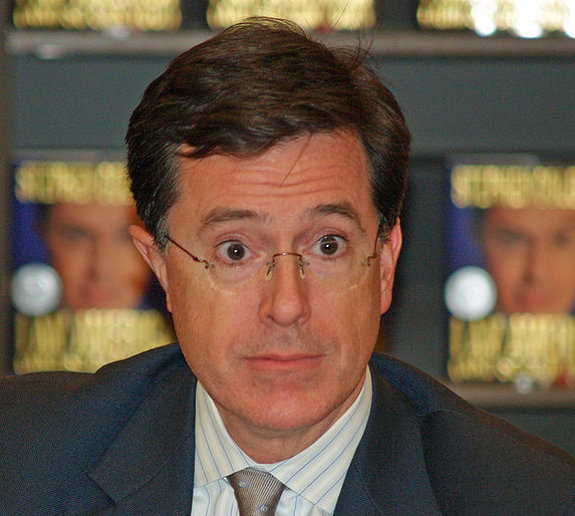
Stephen Colbert has satirized super PACs. But his real-life counterpart is a Floridian. (Photo by David Shankbone/Wikimedia Commons.)
By Howard Goodman
Florida Center for Investigative Reporting
Stephen Colbert and his adventures with his super PAC — for which he collected more than $1 million in real money for a threatened run for “President of the United States of South Carolina” — made for brilliant satire.
Now, unlike the comedic Colbert, here is a Florida guy who is seemingly serious — but no less absurd.
Josue Larose, of Plantation, has formed 330 political action committees (including the “Billionaire Josue Larose’s Best Friends Committee” and “Florida Economic Elites Political Committee”) and 40 political parties (the “American Imperialists Political Party”) over the last four years. No wonder he’s been dubbed “PAC-Man.”
All of his organizations appear to be in name only. Larose has admitted to elections officials that he didn’t actually have the tens of millions of dollars he claimed to have raised.
Funny as all this sounds, election officials aren’t amused by the ton of paperwork all these filings are requiring them to process. The Florida Elections Commission has accused him of 2,052 counts of filing false campaign reports. He could face $2 million in fines.
Jon Burstein, a reporter for the South Florida Sun Sentinel who has been following Larose for a couple of years, writes:
The licensed real estate agent has run for a variety of political offices, vying simultaneously in 2010 for governor and seats in the Florida Senate and U.S. House of Representatives. He has called himself a billionaire, economist and lobbyist and a “famous Realtor.” …
When it came to his gubernatorial campaign, elections officials became suspicious when among his hundreds of supposed contributors, they saw donors who listed their occupation as “female Catholic priest.” Only males can be priests in the Catholic Church.
The Florida Division of Elections subpoenaed Larose’s bank records and found that he hadn’t opened a separate account for his gubernatorial bid, as required by law. When the FEC investigator confronted him, he admitted he had lied about raising millions of dollars, state records show.
“(Larose) stated he wanted to make it appear as though he had financial activity on the same level as his opponents and stated he ‘didn’t do it to be a bad thing,'” according to the FEC investigative report. Larose ended up receiving 121 votes for governor in the election that Republican Rick Scott won.
As he fights accusations of violating state election laws, Larose still controls more than 600 PACs or electioneering groups known as “527s” that promote a specific cause or message.
He’s formed 446 political fundraising organizations in Broward County alone, including ones for Taco Bell customers, Heineken beer drinkers and “wealthy persons.” Outside Larose’s groups, there are about 20 political action committees registered with the Broward Supervisor of Elections.
The Sun Sentinel was unable to reach Larose, 30, who apparently has run variously as a Democrat and Republican, and who generally shuns interviews. State officials said they couldn’t discuss the case.
Burstein notes that “it’s all perfectly legal to create PACs by the dozens — even hundreds.” And there were no signs that Larose actually sought money for the political organizations. On the rare occasion that Larose did give an interview, in 2009, he told Burstein he was forming the groups “to give everybody a voice.”
Larose’s adventures as PAC-Man have drawn alarms from campaign-finance reformers. Noting that Larose had registered 60 SuperPacs as of November — a quarter of the then-total filed at the Federal Elections Commission — ProPublica reported:
His actions show how easy it is to form Super PACs, which, unlike conventional PACs, can raise unlimited amounts of money from individuals and corporations and make unlimited expenditures on behalf of candidates, as long as they don’t donate to candidates directly and don’t coordinate with candidates or political parties.
Larose “shows how absurd Super PACs are,” said Fred Wertheimer, president of Democracy 21, a campaign-finance watchdog group, adding that Super PACs could eviscerate contribution limits that have existed for decades. “This guy looks like he’s just playing games, but he’s playing games in a very dangerous world.”
Since the Citizens United ruling in January 2010, Super PACs, with their turbocharged fundraising and spending, have outpaced old-fashioned PACs, which can accept annual donations only of $5,000 or less and give a maximum of $5,000 per election to candidates and $15,000 to political parties.
How much money? A whopping $181 million over the last two years, a majority of it coming from fewer than 200 super-rich people, according to this handy summary.
The Colbert Report, which knows something about comedic excess, found Larose so absurd that a couple of producers put Burstein on camera last month to talk about him. It was a case of satire meeting reality … to heighten the satire.
The hall-of-mirrors effect was compounded by ABC News.com, which wrote about Larose last month, quoting a researcher who called him “a real-life Stephen Colbert.” The headline: “Anyone can make a super PAC.”
Larose has courted trouble by lying in official paperwork for three years. He’s made it harder to research real PACs by flooding elections offices with hundreds of fake ones.
But, really, for the state to hit back with slew of charges carrying a potential $2 million in fines, that sounds like overkill.
Meantime, of course, there are no penalties for perverting the political system by opening floodgates of unrestricted money — all to bombard voters with punishing barrages of negative advertising. The U.S. Supreme Court has made that perfectly legal.
